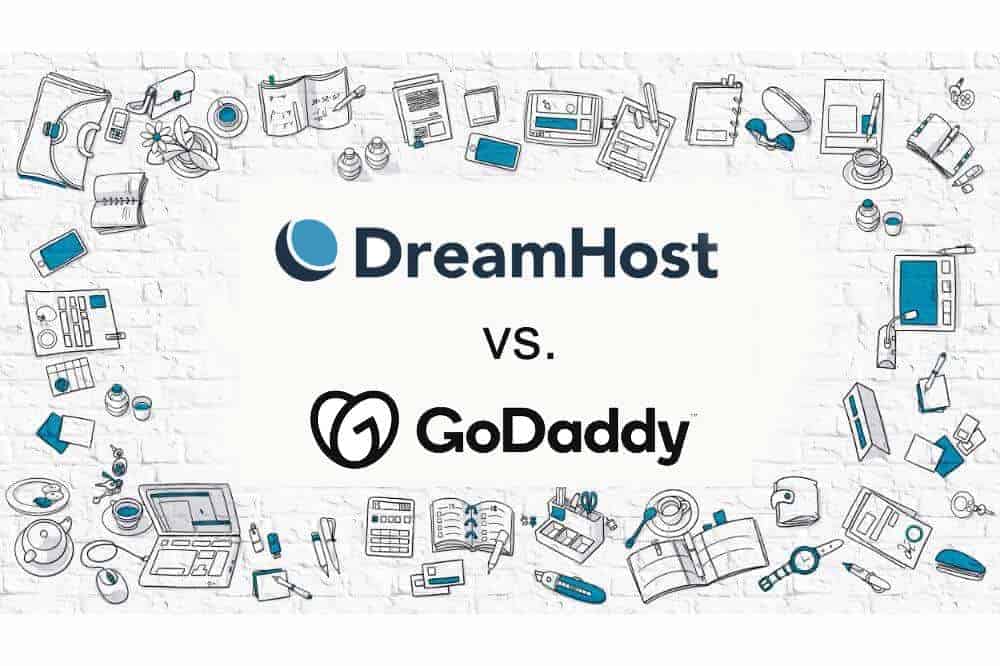You’ve come to the right site to seek a GoDaddy substitute. We shall cover the top 10 rivals of GoDaddy in this blog post. These businesses provide a wide range of services, from website design and hosting to domain registration. Read on for the top 10 alternatives if you’re unsatisfied with GoDaddy’s service or want to learn more about your options.
A well-known GoDaddy rival, Domain.com, provides domain registration, web hosting, and email services. They provide 24/p Support and have an intuitive interface. They also use a free domain name when you join an annual plan.
Namecheap is another well-liked substitute for GoDaddy. They have affordable costs for domains, web hosting, email hosting, SSL certificates, and other services. Namecheap is renowned for its top-notch customer support; they provide round-the-clock assistance and have a comprehensive knowledge base.
For individuals seeking a simple-to-use domain registrar, hover is a fantastic choice. They provide customizable privacy settings, honest pricing, and friendly customer service. In addition, Hover provides all domains with a free whois privacy service.
In addition to shared hosting, WordPress hosting, VPS hosting, and other services, Bluehost is a web hosting provider. They are one of the biggest web hosting providers in the globe and assist around the clock. For individuals searching for an all-in-one answer to their website needs, Bluehost is a fantastic choice.
Another web host that provides numerous services, such as shared hosting, WordPress hosting, cloud hosting, and more, is SiteGround. They are renowned for their superior customer service and quick, dependable service. Additionally, every plan from SiteGround includes a free SSL certificate.
A web hosting firm, InMotion Hosting, provides many services, such as shared hosting, WordPress hosting, VPS hosting, and others. They have a fantastic customer care team and provide quick and dependable service. Additionally, each plan from InMotion Hosting includes a free SSL certificate.
With the help of the website builder Weebly, you may make a website without knowing any code. It is easy to use and provides a selection of templates. Weebly also includes eCommerce functionalities to enable you to sell goods on your website.
Another well-liked website builder that enables you to develop a website without any coding experience is Wix. With more than 500 templates available, it is simple to use. Wix also provides eCommerce tools, allowing you to run an online store.
Squarespace is a well-known website builder that provides a selection of templates. You may sell things on your website thanks to its easy-to-use eCommerce capabilities. Additionally, Squarespace provides a free trial to use it before purchasing.
Shopify is an online store creation tool that enables you to launch an online shop. It is simple to use and offers more than 100 different themes. Additionally, Shopify provides a 14-day free trial so that you can use it before committing to a subscription plan.
You’ve probably heard of GoDaddy, whether you were confused by their name or confused by their marketing. Several websites hosting services and domain name marketplaces are available for those interested in building their small online world, including GoDaddy. Organizations and business owners value GoDaddy’s variety of website design and customization possibilities. On the other hand, are they the best option for site creation and hosting?
Customers of other web hosting providers, including Bluehost, Domain.com, Dreamhost, and HostGator, receive comparable services. But we’ve already done all the research and analysis, so you don’t have to! Without any coding knowledge, creating a stunning website is quite simple with GoDaddy. With their drag-and-drop functionality and infinite disk space, you can quickly, and worry-free implement all your most fantastic ideas.
GoDaddy’s website builder offers a selection of templates, editable themes, and mobile editing features if you’re new to website creation. Additionally, you can control all aspects of your online presence from a single platform. Additionally, clients can acquire a domain name from Google Domains for as little as $7/year if they simply wish to register their domain name elsewhere.

Best GoDaddy Alternatives
We have compared several GoDaddy rivals and other website hosting companies to see how they compare features and offerings. Here are our key discoveries:
-BlueHost:
With lots of storage and hosting space, BlueHost is an easy-to-use website builder. Customizing your website is simple, thanks to its user-friendly control panel. All the features you would anticipate from a platform of this type are included with a Bluehost subscription, including a free domain name, simple tools for building websites, and WordPress integration. While GoDaddy only offers a limited number of databases, Bluehost offers more email accounts.
With their unique hosting package, multiple disk data mirroring is used to protect user and website data. Password-protected file systems, IP address blacklisting, digital certificates, and private key management are additional options for securing your website. Users can choose which security measures to employ. The drawback is that Bluehost’s services do not automatically perform daily security backups. Therefore, users need to do so themselves.
Bluehost provides various digital marketing services to meet businesses’ demands, including advertising, website SEO, social media marketing, and brand exposure. Users that desire a quick-loading website with Cloudflare integration have access to e-commerce hosting alternatives and Managed WordPress hosting. Additionally, Bluehost is a beautiful choice for those looking for personalization or a switch from their present provider due to its speed and dependability characteristics.
Pros
- Your website will receive a free domain name for the first year.
- The customer service is friendly, and the user interface is simple.
Cons
- There aren’t any other options for cloud hosting.
- The cost of entrance is much higher than the cost of the renewal.
-Domain.com:
Customers of Domain.com benefit from limitless databases, FTP logins, and add-on domains to make the most of their hosting experience. Additionally, they offer services for shared account hosting and WordPress hosting. Users can host multiple websites on a single server with higher-tier shared server hosting services. System users can employ scalable bandwidth, limitless subdomains, and free cloud storage.
The website is consistently available and offers free domain registration for the first year, but after that, the domain extension will be charged. Additionally, because it provides free SSL certificates to its consumers, they can feel secure when transacting on its website, making it an excellent substitute for GoDaddy competitors for e-commerce businesses. They have a password-protected directory that can be accessed safely and conveniently as part of their cybersecurity.
Although Domain.com provides many fantastic features, they fall short compared to other platforms in terms of accessibility and integration. While their system does, for instance, provide WordPress hosting, it does not support Windows-based, cloud, reseller, or dedicated servers. If you’re not put off by that information, though, Domain.com’s e-commerce capabilities, unlimited storage, and WordPress hosting options can be precisely what your company needs to thrive.
Pros
- constant availability
- a user-friendly website builder
- The more domains you access, the more expensive our plans are.
Cons
- There are just two types of hosting available: shared and WordPress.
- There aren’t any monthly plans accessible right now.
-DreamHost:
In addition to a web-based TV guide with social media networks, users can access more than 1 million video and audio titles. Additionally, it offers users limitless internal storage and bandwidth and the ability to host content and emails. A free SSL certificate is given to each website the software hosts to maintain security. Automatic backups also protect website data from unintentional loss or damage.
DreamHost has a simple installation method that simply requires one click. After installation, you get access to WordPress sync and several app connectors. FTP, or file transfer protocol, is another option. In addition to using navigation trees, which make it simple for people to navigate, the setup also comes with preloaded themes, allowing you to construct your website immediately.
DreamHost can be the right platform if you lack knowledge and prefer simplicity over customization possibilities. They provide users an administrator dashboard, which is less cluttered than a cPanel but has fewer options. In contrast to website design specialists who would desire more features to play with, it is thus more suited for use by the average user.
Pros
- Our systems are always up and running, providing you with the best possible customer service. Our entire network is always being watched over.
- The first year of free domain name registration is provided.
- a 50GB storage space, and limitless bandwidth
Cons
- There is no phone customer service provided, only live chat support.
- Only a few server locations are available.
-HostGator:
For companies interested in using a website to develop their brand, Hostinger is an excellent GoDaddy substitute for website hosting. They offer credits for Google and Bing advertising, and their method might allow an infinite number of people to view your websites. There is also managed WordPress hosting accessible.
With free SSL certificates and Virtual Private Servers to protect customer data, HostGator takes pride in its security. Any size business can choose a hosting solution that works for them, from shared servers for startups to dedicated servers for established companies. Remember that dedicated servers cost more but provide more bandwidth and sophisticated security features.
Unfortunately, HostGator’s distinctive features come at several extra charges. For instance, their less expensive solutions only permit one domain name instead of allowing for an unlimited number of domains. But even the most affordable plan satisfies the fundamental hosting needs of small business websites. The content management system, numerous tools for building sites, and accessible one-click interfaces with other programs and tools are all freely available to users.
Pros
- For the first year, register your domain name for free.
- Customer service is offered seven days a week, twenty-four hours a day.
- Our costs are reasonable.
Cons
- The servers displayed are all US-based servers.
- Not every hosting company offers Windows servers.

Top Features of Web Hosting Services
Your demands and requirements, as well as several other criteria, will determine which GoDaddy options are best for you. Therefore, instead of asking yourself what the best GoDaddy substitute is, consider what criteria would be most helpful to you while creating a website.
-Ease of Use vs. Advanced User Options
It’s critical to consider the platform’s ease of use while evaluating website builders. For a user creating a website, something as simple as a one-click installation or having straightforward navigation can make all the difference. For expert users who seek greater site personalization, these features can mean fewer options are accessible. For instance, Dreamhost limits the number of customization users may make to their websites by using a dashboard rather than a control panel.
-Reliability and Speed
You will require a top-notch web hosting platform to make your website accessible and functioning efficiently for visitors. Take the average uptime throughout a server’s existence to determine reliability. For instance, Bluehost has a 99.99 percent uptime, indicating that its servers are very stable, and the color blue denotes how quickly its website loads (on slow connections).
-Shared and Non-shared Server Options
Users who want to manage their server occasionally utilize private or dedicated servers. Businesses that host websites typically enhance their security and speed. On the other hand, non-shared servers may cost more through web hosting providers and require more technical expertise to run.
-Accessibility and Integrations
Although it lacks alternatives for Windows or clouds servers, Domain.com is a dependable hosting platform that provides one-click integrations for WordPress and other content management systems.
-Data Synchronization
Data synchronization is the capacity to transfer private data onto web hosting software. Users can use it there and access it in this way. Many web hosting platforms offer speedy data synchronization features, but Network Solutions provides their customer’s domain name transfer and website redirection.

How to Choose the Best Web Hosting Provider
When looking for a new domain host, consider one with relative dependability, usability, speed, and extra services. Depending on the type of website you want to create, your user experience level, and the scale of your business, the optimal components for your needs may vary. If you have prior experience creating websites and are ready to make one for a major corporation, consider a non-shared server choice. It’s preferable to start with a more user-friendly, shared hosting platform as a good GoDaddy alternative if this doesn’t seem like you and you’re just getting started with website construction and management.
How to choose the right cloud hosting provider for your business
Companies rely on cloud service providers in the twenty-first century to conduct business. Selecting the right option for you can be difficult, given the abundance of choices. What factors should you consider when choosing a web host? This blog post will go over the top 10 GoDaddy alternatives and competitors.
- What kind of website do I need, you may be asking yourself? You may require something more potent than shared hostings, such as VPS hosting, if your website is complicated or receives a lot of traffic. But shared hosting ought to be adequate if you’re just getting started.
- What kind of assistance do you require? While some service providers give support around the clock, others have fewer hours.
- Third, what kinds of skills are necessary? While some vendors offer unrestricted storage and bandwidth, others do not.
- Finally, what budget are you working with? It’s important to compare prices before choosing a cloud hosting provider because they can be expensive.
The bottom line is that there are many things to consider when choosing a web hosting company. However, if you bear these suggestions in mind, you ought to be able to identify a provider who is appropriate for your requirements.
Web hosting company Bluehost is well-known and has been around for a while. They offer several types of hosting, including shared, VPS, and dedicated server hosting. Additionally, Bluehost provides the most expensive plan, which includes unlimited data and bandwidth storage and round-the-clock customer support.

How does Godaddy Blog Hosting work?
Godaddy offers a straightforward solution that everyone can use, unlike other blogging platforms requiring you to jump through hoops to get started. There are no restrictions on what you can do with your blog when using Godaddy. Using Godaddy’s drag-and-drop builder, you may give your website a unique design or pick from various pre-made themes. Make use of the extensive selection of plugins and widgets that Godaddy offers if you want to expand the functionality of your blog.
Here are ten of the top competitors:
-WordPress:
On the internet, WordPress is a popular blogging platform. It has a vast selection of features and plugins and is free to use. WordPress is an excellent option for people looking for a simple, user-friendly platform.
-Blogger:
Google-owned Blogger is a well-known blogging platform that provides tools and templates to let you personalize your blog. You can link your Blogger account to your Google+ account to share posts with others in your circles.
-Tumblr:
You may easily publish text, photographs, quotes, links, and audio files on the microblogging site Tumblr. Additionally, Tumblr offers a selection of themes and customization choices. You can sign up for a free account or upgrade to a premium account to get more storage space and extra features.
-Medium:
With the help of the social publishing platform Medium, you may tell the rest of the world about your experiences. With the help of Medium’s many capabilities, you can structure and make your tales more appealing, expanding the audience you may reach. Create a free account or upgrade to a premium account to access more features.
-Typepad:
A blogging platform called Typepad provides both free and premium subscriptions. With Typepad, you can access a wide range of themes and features to personalize your blog. Additionally, you can link your Typepad account to your Twitter or Facebook page.
-Squarespace:
Squarespace is a user-friendly platform that will assist you in building a stunning website or online store. Squarespace helps you create the website of your dreams by providing a variety of designs and tools. Their services can be used to sell both tangible and digital goods.
-Weebly:
Use Wix to build your website or online store instead of Weebly. With Weebly, you may completely customize your website thanks to the abundance of templates and resources at your disposal. Weebly allows you to sell goods, services, or digital products as effortlessly as any other marketplace.
-Wix:
A website or online store can be created using Wix, an all-in-one platform. You can sell goods, services, or digital products using Wix’s many layouts and capabilities.
-Joomla:
Joomla is a system for creating and managing the content on your website. Joomla contains a selection of themes and components that can be used to customize your site and makes it simple for you to change it to suit your needs. Joomla can be used to sell products, services, or digital commodities.
-Drupal:
The content on your website can be easily created and managed with the help of Drupal, a robust content management system. You may easily adapt your website with Drupal to sell goods, services, or digital products. Pick the ideal templates and modules for your business from a wide selection.
Here are just a few of the several GoDaddy rivals that are available. Consider your needs and budget when choosing a substitute. Choose an appropriate platform for you because each one offers a unique set of features and tools.

Network Solutions vs. GoDaddy
After researching the differences between GoDaddy and Network Solutions, I learned that data loss is a persistent problem in the hosting industry. Both businesses have made considerable investments in security to guarantee that your website and its information remain secure.
GoDaddy ensures that the information on your website is always secure by using automatic daily backups. Your website will be restored to its previous day’s state in the case of a malicious attack, such as ransomware that encrypts corporate files. GoDaddy employs a Secure Socket Layer (SSL) to safeguard data transferred back and forth between servers and customers. Doing this can lessen the risk of server and website hacks. If a visitor uses his IP address and server to query your GoDaddy-hosted website, he can only learn the communication’s contents if he has access to both.
Network Solutions makes a significant investment in protecting the security of its servers and user data. The hosting company routinely checks your website for hidden viruses, blacklisting, and. access redirection.
Data-center-class firewall from Network Solutions has controls that assist stop illegal access and manipulation. The firewall is used in conjunction with round-the-clock surveillance to ensure that any security threat is quickly discovered and mitigated.
Users of websites can rely on Network Solutions to regularly back up their site’s content and keep it secure. The most recent version of your website will always be accessible for restoration in the case of an attack. Additionally, GoDaddy and Network Solutions claim they will do their part to prevent hackers from accessing user websites and are on par in terms of modern security infrastructure.

DreamHost Vs. GoDaddy
1. Plans And Pricing
WordPress, Linux, WooCommerce, VPS, Cloud, and dedicated servers are all supported by DreamHost’s shared hosting. Shared hosting for Windows and Linux, WordPress, reseller, VPS, and dedicated servers is available from GoDaddy.
GoDaddy offers four Linux shared hosting plans and three Windows shared hosting plans. However, DreamHost only offers two Linux shared hosting plans.
Free domains are also included when you purchase any hosting service from GoDaddy or DreamHost. DreamHost provides two shared plans with prices ranging from $6.34 to $14.02. GoDaddy offers four programs with prices ranging from $5.75 to $19.19. Both services include quarterly, yearly, or monthly billing.
Both hosting services offer money-back guarantees, but DreamHost’s is longer—97 days as opposed to GoDaddy’s 30-day period. The only company that provides free website relocation is DreamHost.
2. Features
With its shared hosting services, DreamHost provides limitless storage and bandwidth. Email accounts come at an additional cost. WordPress, personalized control panels, a free website builder, and automated backups are pre-installed. You will also receive a free SSL certificate with an unlimited subscription.
GoDaddy offers 100 GB of storage but limitless bandwidth. However, you receive a free Office 365 email for an entire year. There is a built-in standard cPanel, but no free SSL certificate for the most affordable plans.
3. Performance
While GoDaddy has two locations in the U.S. and India, DreamHost only has one server. These hosting providers use HDD storage, which performs and loads more slowly than the more advanced SSD storage. No plan offered by DreamHost includes a free CDN or content delivery network. It is only available through GoDaddy’s WordPress plans.
Regarding downtime, GoDaddy outperforms DreamHost by a wide margin. DreamHost’s website uptime is below average, which could hurt your company’s financial performance. Although the loading times for these two hosts are comparable, they are not very fast. Some places have incredibly sluggish webpage loading.
4. Security
In their most straightforward plans, DreamHost offers a lot more security features. Firewalls, filters, and site encryption are all provided. GoDaddy’s security protections are fundamental. While automatic backups and an SSL certificate are included with DreamHost, the same capabilities are extra with GoDaddy.
5. Support
Both DreamHost and GoDaddy offer few support alternatives, albeit GoDaddy’s are marginally superior. You can speak with a customer support agent at GoDaddy over the phone or via live chat. The wait time for services is a drawback. At certain times, wait times might reach an hour, and live support isn’t always available. Both offer comprehensive knowledge bases and message boards as resources for help.
Conclusion
There are several excellent alternatives to GoDaddy if you’re searching for one. You can find something that satisfies your demands with any of the businesses on our list because they all provide a wide range of services. We hope that this blog article has aided you in exploring your alternatives and facilitated a small amount of decision-making. Gratitude for reading!























